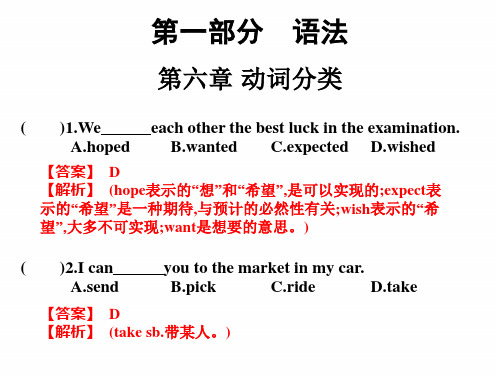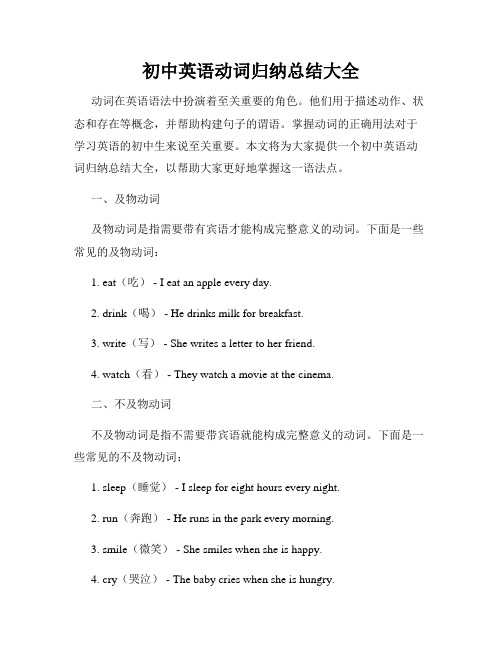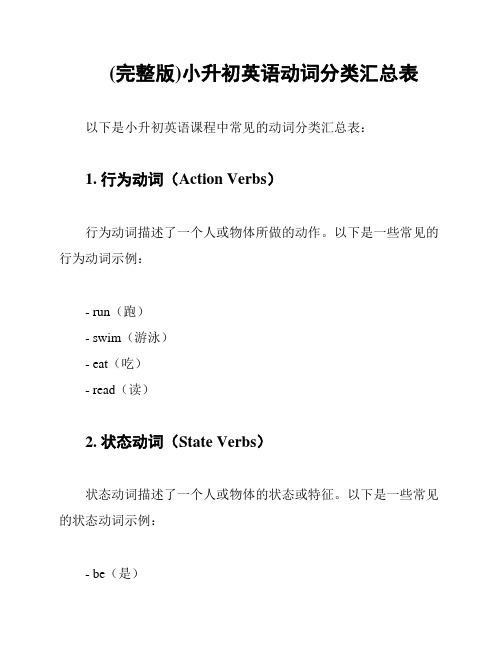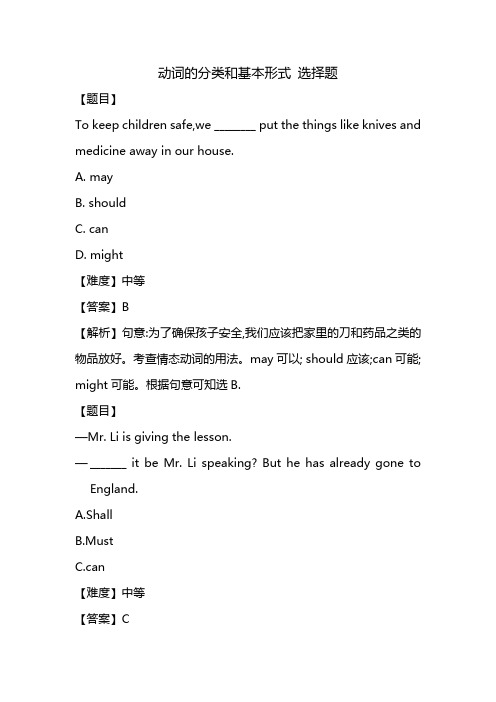英语动词分类大全(附练习)
2021高职高考英语练习1语法:第六章 动词分类

( )16.I
three hours on the text and it will
me
another hour for the grammar.
A.have spent;take
B.spend;need have
C.take;spend
D.need;take
【答案】 A 【解析】 (spend的主语必须是人,常用于以下结构:①spend time /money on sth.在……上花费时间(金钱);②spend time /money (in) doing sth.花费时间(金钱)做某事;③spend money for sth.花钱 买……。 cost的主语是物或某种活动,还可以表示“值”,常见用法如 下:①sth. costs (sb.) +金钱,某物花了(某人)多少钱;②(doing) sth. costs (sb.)+时间,某物(做某事)花了(某人)多少时间。take后面常跟 双宾语,常见用法有:It takes sb.+时间+to do sth.做某事花了某人多 少时间。pay的基本用法是:①pay (sb.) money for sth.付钱(给某人) 买……;②pay for sth.付……的钱;③pay for sb.替某人付钱。); ④pay sb.付钱给某人;⑤pay money back 还钱;⑥pay off one’s money还清钱。)
lamp.
A.invented
B.discovered
C.found
D.created
the electric
【答案】 A 【解析】 (invent 发明,指“创造出世界上原来没有的事物或方法”, 如:发明蒸汽机,发明电视机等。discover 发现,是指第一次看到或 找到前人没有看到的事物、现象或规律,如:discover America; discover the theory of relativity。find 发现,找到,看到,强调发现的 结果,如:find a way,find a job。create 创造,创建,形成,一般指创造 机会、岗位、氛围等,如:create a file;create a relaxing atmosphere /a good impression。)
人教版七年级上册英语动词分类及用法+练习

七年级英语动词分类及用法动词(v.): 一般情况下,按照作用和用途,英语动词可分为三类:be动词、情态动词,行为动词、助动词。
be动词表示状态, 情态动词表示说话人的情绪态度或看法,行为动词表示动作,助动词没有实际词意,只起语法作用。
一、be动词:英语中be动词也叫系动词,基本形式有am, is, are 三种。
其用法如下:我(I)用am,你(you)用are,is用于他(he),她(she),它(it);单数名词用is,复数名词全用are.变疑问,往前提,句末问号莫丢弃。
变否定,更容易, be后not莫忘记。
疑问否定任你变,句首大写莫迟疑。
be动词练习1. I ________ from Australia.2. She _______ a student.3. Jane and Tom _________ my friends.4. My parents _______ very busy every day.5. Where _________ you from?6._________ they your new friends?7. The girl______ Jack's sister.8. The dog _______ tall and fat.9. Jack’s friend ______ in Class One.10. Where _____ your mother? She ______ at home.11. Whose dress ______ this?12. That ______ my red skirt.14. These _____ buses.15. Some tea ______ in the glass.16. Gao Shan's shirt _______ over there.17. ______ David and Helen from England?18. We ____ friends.19. The two cups of milk _____ for me.20. The man with big eyes _______ a teacher.二、助动词:本身无实意,只有实意动词作谓语时才涉及使用,起到辅助作用。
初一英语动词分类及用法

初一英语动词分类及用法动词(v.): 一般情况下,按照作用与用途,英语动词可分为三类:be动词、情态动词,行为动词、助动词。
be动词表示状态, 情态动词表示说话人的情绪态度或看法,行为动词表示动作,助动词没有实际词意,只起语法作用。
be动词: 英语中的be动词也叫系动词,根本形式有am, is, are 三种。
其用法如下:我(I)用am,你(you)用are,is用于他(he),她(she),它(it);单数名词用is,复数名词全用are.变疑问,往前提,句末问号莫丢弃。
变否认,更容易, be后not莫忘记。
疑问否认任你变,句首大写莫迟疑。
练习:1. I ________ from Australia.2. She _______ a student.3.Jane and Tom _________ my friends.4. My parents _______ very busy every day.5.Where _________ you from6._________ they your new friends7. The girl______ Jack's sister.8. The dog _______ tall and fat.9. Jack’s friend ______ in Class One.10. Where _____ your mother She ______ at home.11. Whose dress ______ this12.That ______ my red skirt.14. These _____ buses.15. Some tea ______ in the glass.16.Gao Shan's shirt _______ over there.17. ______ David and Helen from England18. We ____ friends.19. The two cups of milk _____ for me.20.The man with big eyes _______ a teacher.情态动词:情态动词是一种本身有一定的词义,表示说话人的情绪、态度或语气的动词,但不能单独作谓语,只能+动词原形,构成复合谓语,没有人称与数的变化。
初中英语动词归纳总结大全

初中英语动词归纳总结大全动词在英语语法中扮演着至关重要的角色。
他们用于描述动作、状态和存在等概念,并帮助构建句子的谓语。
掌握动词的正确用法对于学习英语的初中生来说至关重要。
本文将为大家提供一个初中英语动词归纳总结大全,以帮助大家更好地掌握这一语法点。
一、及物动词及物动词是指需要带有宾语才能构成完整意义的动词。
下面是一些常见的及物动词:1. eat(吃) - I eat an apple every day.2. drink(喝) - He drinks milk for breakfast.3. write(写) - She writes a letter to her friend.4. watch(看) - They watch a movie at the cinema.二、不及物动词不及物动词是指不需要带宾语就能构成完整意义的动词。
下面是一些常见的不及物动词:1. sleep(睡觉) - I sleep for eight hours every night.2. run(奔跑) - He runs in the park every morning.3. smile(微笑) - She smiles when she is happy.4. cry(哭泣) - The baby cries when she is hungry.三、状态动词状态动词描述主语的状态或性质,不表示具体的动作。
常见的状态动词有:1. be(是,存在) - They are students.2. feel(感觉) - I feel tired today.3. seem(似乎) - It seems difficult to understand.4. appear(出现) - The sun appears in the sky every morning.四、助动词助动词用于构成各种时态和语态,辅助主要动词的运用。
初中英语动词知识点梳理、例句及练习题

初中英语动词知识点梳理、例句及练习题动词的定义与分类动词是句子中的一个重要成分,用来表示动作、状态、事件等。
根据不同的特征,动词可以分为以下几类:1. 及物动词:需要接受动作的对象,例如:throw(扔)、see (看到)。
2. 不及物动词:不需要接受动作的对象,例如:run(跑)、sleep(睡觉)。
3. 连系动词:用来联系主语和表语,表示状态或特征,例如:be(是)、feel(感觉)。
动词的时态动词的时态表示动作或状态发生的时间。
以下是主要的时态:1. 现在时:表示现在正在进行或经常发生的动作,例如:play (玩)、go(去)。
2. 过去时:表示过去发生的动作或状态,例如:studied(研究)、walked(走)。
3. 将来时:表示将来要发生的动作或状态,例如:will play (将玩)、is going to eat(打算吃)。
动词的语态动词的语态表示动作的主体和对象之间的关系。
以下是常见的语态:1. 主动语态:动作的执行者是主语,例如:The cat chased the mouse(猫追逐老鼠)。
2. 被动语态:动作的承受者是主语,例如:The mouse was chased by the cat(老鼠被猫追逐)。
动词的用法动词的用法有很多种,主要包括以下几个方面:1. 基本形式:动词的原形,例如:play(玩)、eat(吃)。
2. 动名词形式:动词+ing,作为主语、宾语、介词宾语等,例如:Swimming is my favorite activity(游泳是我最喜欢的活动)。
3. 过去分词形式:动词的过去分词形式,用于完成时态、被动语态等,例如:written(写)、seen(看到)。
4. 助动词:用于构成各种时态、否定句、疑问句等,例如:can(能)、will(将)。
动词的例句及练题1. 请用动词的适当形式填空:- She ______ (swim) in the pool every morning.- They ______ (play) soccer last Sunday.2. 请根据句意选择正确的动词形式填空:- He enjoys ______ (listen / listening) to music in his free time.- The book ______ (write / written) by a famous author.3. 请将下列句子改写为被动语态:- They built a new bridge.- The students are cleaning the classroom.初中英语动词知识点梳理为初中学生了解动词基本概念和用法提供了重要的参考。
(完整版)小升初英语动词分类汇总表

(完整版)小升初英语动词分类汇总表以下是小升初英语课程中常见的动词分类汇总表:1. 行为动词(Action Verbs)行为动词描述了一个人或物体所做的动作。
以下是一些常见的行为动词示例:- run(跑)- swim(游泳)- eat(吃)- read(读)2. 状态动词(State Verbs)状态动词描述了一个人或物体的状态或特征。
以下是一些常见的状态动词示例:- be(是)- have(有)- like(喜欢)- know(知道)3. 情态动词(Modal Verbs)情态动词用于表示能力、可能性、必要性、愿望等。
以下是一些常见的情态动词示例:- can(能)- may(可能)- must(必须)- would like(想要)4. 不及物动词(Intransitive Verbs)不及物动词不需要宾语来完成动作。
以下是一些常见的不及物动词示例:- sleep(睡觉)- laugh(笑)- walk(走)5. 及物动词(Transitive Verbs)及物动词需要宾语来完成动作。
以下是一些常见的及物动词示例:- eat(吃)- write(写)- watch(看)此文档汇总了小升初英语课程中常见的动词分类,其中包括行为动词、状态动词、情态动词、不及物动词和及物动词。
希望能对学生们在研究英语动词方面有所帮助。
以上为完整版小升初英语动词分类汇总表。
*Note:* *以上内容根据常见的英语动词分类提供示例,具体的动词分类可以根据教材和教学内容进行详细补充。
*。
初中英语语法练习题 动词的分类和基本形式(带答案和解析)

动词的分类和基本形式选择题【题目】To keep children safe,we ________ put the things like knives and medicine away in our house.A. mayB. shouldC. canD. might【难度】中等【答案】B【解析】句意:为了确保孩子安全,我们应该把家里的刀和药品之类的物品放好。
考查情态动词的用法。
may可以; should应该;can可能; might可能。
根据句意可知选B.【题目】—Mr. Li is giving the lesson.—_______ it be Mr. Li speaking? But he has already gone to England.A.ShallB.MustC.can【难度】中等【答案】C【解析】句意: —李老师正在上课。
—可能是李老师在讲课吗?可他已经去英国了。
本题考查情态动词的用法。
Shall应该;Must一定;can 可能。
由后面的“he has already gone to England”可知,前面说的是“可能是李老师在讲课吗”。
表示可能性的推测,使用情态动词can。
故正确答案为C项.【题目】—Some people don' t show their talents at the very beginning. —I agree. Even Einstein_______ read until he was seven.A. can'tB. mustC. couldn'tD. needn't【难度】中等【答案】C【解析】句意:—有些人在一开始时没表现出他们的天赋。
—我同意。
即使爱因斯坦也是到他7岁时才能阅读。
本题考查情态动词。
can't 不能; mustn't禁止; couldn't不能,can't的过去式; needn't不需要。
高中英语语法——情态动词总结(附带练习)

情态动词总结I 情态动词的特征:1.本身有词义。
2.不能独立作谓语。
2. 后接动词原形一起构成谓语。
3. 不随人称和数的变化。
II 情态动词各自的基本意义及用法:1.大多数情态动词(除表‘能力、许可、意志’外),都可以表示推测,其程度有差异。
按可能性程度的高低排列为:must﹥will ﹥would ﹥ought to ﹥should完全肯定完全可能很可能﹥can ﹥could﹥may ﹥might可能有可能2. 区分情态动词的否定含义:may not或许不、可能不might not可能不can’t 不可能mustn’t不许、禁止shouldn’t不应该needn’t 不必1.情态动词表推测的反意疑问句,简单来说,就是以情态动词后的时态为淮,如句子里有明确的时间状语,则以其为准。
2.以must 为例:E.g. 1. You must be hungry now, aren’t you?2. He must be watching TV , isn’t he ?3 Tom must have lived her for a long time, hasn’t he ?4. She must have arrived yesterday, didn’t she?注:如选择题中(以She must have arrived yesterday, didn’t she?为例)既有didn’t she又有hasn’t she则以didn’t she?为最佳答案。
IV 情态动词专项练习与解析一( ) 1. You _____ return the book now. You can keep it till next week if you like.A. can’tB. mustn’tC. needn’tD. may not( ) 2. Where is my pen? I _____ it.A. might loseB. would have lostC. should have lostD. must have lost( ) 3. I wish I _____ you yesterday.A. seenB. did seeC. had seenD. were to see( ) 4. I didn’t hear the phone. I _____ asleep.A. must beB. must have beenC. should beD. should have been( ) 5. If my lawyer _____ here last Saturday, he _____ me from going.A. had been; would have preventedB. had been; would preventC. were; would preventD. were; would have prevented( ) 6. He _____ you more help, even though he was very busy.A. might have givenB. might haveC. may have givenD. may give( ) 7. If it _____ for the snow, we _____ the mountain yesterday.A. were not; could have climbedB. were not; could climbC. had not been; could have climbedD. had not been; could climb( ) 8. Without electricity human life _____ quite difficult today.A. isB. will beC. would have beenD. would be( ) 9. A computer _____ think for itself, it must be told what to do.A. can’tB. couldn’tC. may notD. might not( ) 10. Jenny _____ have kept her word. I wonder why she changed her mind.A. mustB. shouldC. needD. would( )11. We _____ last night, but we went to the concert instead.A. must have studiedB. might studyC. should have studiedD. would study( ) 12. — Could I borrow your dictionary?— Yes, of course you _____.A. mightB. willC. canD. should( ) 13. Tom ought not to _____ me your secret, but he meant no harm.A. have toldB. tellC. be tellingD. having told ( ) 14. — If he _____, he _____ that food.— Luckily he was sent to the hospital immediately.A. was warned; would not takeB. had been warned; would not have takenC. would be warned; had not takenD. would have been warned; had not taken ( ) 15. Peter _____ come with us tonig ht, but he isn’t very sure yet.A. mustB. mayC. canD. will( ) 16. I told Sally how to get here, but perhaps I _____ for her.A. had to write it outB. must have written it outC. should have written it outD. ought to write it out( ) 17. I didn’t see your sister at the meeting. If she _____, she would have met my brother.A. has comeB. did comeC. cameD. had come ( ) 18. — Shall I tell John about it?—No, you _____. I’ve told him already.A. needn’tB. wouldn’tC. mustn’tD. shouldn’t ( ) 19. When a pencil is partly in a glass of water, it looks as if it _____.A. breaksB. has brokenC. were brokenD. had been broken( ) 20. It’s nearly seven o’clock. Jack _____ be here at any moment.A. mustB. needC. shouldD. can( ) 21.— There were already five people in the car but they managed to take me as well.— It _____ a comfortable journey.A. can’t beB. shouldn’t beC. mustn’t have beenD. couldn’t have been ( ) 22. Johnny, you _____ play with the knife, you _____ hurt yourself.A. won’t; can’tB. mustn’t; mayC. shouldn’t; mustD. can’t; shouldn’t ( ) 23. The fire spread through the hotel very quickly but everyone _____ get out.A. had toB. wouldC. couldD. was able to ( ) 24. — When can I come for the photos? I need them tomorrow afternoon.— They _____ be ready by 12:00.A. canB. shouldC. mightD. need( ) 25. — I stayed at a hotel while in New York.— Oh, did you? You _____ with Barbara.A. could have stayedB. could stayC. would stayD. must have stayed ( ) 26. — Will you stay for lunch?— Sorry, _____. My brother is coming to see me.A. I mustn’tB. I can’tC. I needn’tD. I won’t( ) 27. — Are you coming to Jeff’s party?—I’m not sure. I _____ go to the concert instead.A. mustB. wouldC. shouldD. might( ) 28. — Write to me when you get home.— _____.A. I mustB. I shouldC. I willD. I can( ) 29. I was really anxious about you, you _____ home without a word.A. mustn’t leaveB. shouldn’t have leftC. couldn’t have leftD. needn’t leave( ) 30. — Is John coming by train?— He should, but he _____ not. He likes driving his car.A. mustB. canC. needD. may专项练习(二)1. I didn’t see her in the meeting room this morning. She _____ at the meeting.A. mustn’t have spokenB. shouldn’t have spokenC. needn’t have spokenD. couldn’t have spoken2. One ought _____ for what one hasn’t done.A. not to be punishedB. to not be punishedC. to not punishedD. not be punished3. If you really want yourself to be in good health, you must ___ always ___ so much.A. not; be smokingB. not; have smokedC. not; to smokeD. be not; smoking4. With so much work on hand, you _____ to see the game last night.A. mustn’t goB. shouldn’t goC. couldn’t have goneD. shouldn’t have gone5. Most of the students felt rather disappointed at the English party. They say that it ______ better organized.A. had beenB. had to beC. must have beenD. could have been6. I’m surprised that he _____ in the exam.A. should failB. would have failedC. may have failedD. should have failed7. The little girl _____ there alone.A. not dare goB. dares not goC. dare not goD. dare not to go8. “Must we do it now?” “No, you _____.”A. won’tB. needn’tC. can’tD. don’t9. He said he would rather not _____ it right now.A. doingB. to doC. doD. to be doing10. You _____ to the meeting this afternoon if you have something important to do.A. needn’t to comeB. don’t need comeC. don’t need comingD. needn’t come11. Put on more clothes. You _____ be feeling cold with only a shirt on.A. canB. couldC. wouldD. must12. I _____ play football than baseball.A. would ratherB. had betterC. like betterD. prefer13. I thought you _____ like something to read, so I have brought you some books.A. mayB. mightC. couldD. must14. There was plenty of times. She _____.A. mustn’t have hurriedB. couldn’t have hurriedC. must not hurryD. needn’t have hurried15. The plant is dead. I _____ it more water.A. will giveB. would have givenC. must giveD. should have given16. You _____ return the book now. You can keep it till next week if you like.A. can’tB. mustn’tC. needn’tD. may not17. It’s still early, you _____.A. mustn’t hurryB. wouldn’t hurryC. may not hurryD. don’t have to hurry18. Please open the window, _____?A. can’t youB. aren’t youC. do youD. will you19. We _____ for her because she never came.A. mustn’t have waitedB. shouldn’t have waitedC. mustn’t waitD. needn’t wait20. — May I stop here? — No, you _____.A. mustn’tB. might notC. needn’tD. won’t21. It’s a fine day. Let’s go fishing, _____.A. won’t weB. will weC. don’t weD. shall we22. I didn’t see her in the meeting room this morning. She _____ at the meeting.A. mustn’t have spokenB. shouldn’t have spokenC. needn’t have spokenD. couldn’t have spoken23. — Please don’t make a noise. — _____. I’ll be as quiet as a mouse.A. Yes, I won’tB. No, I won’tC. No, I willD. Yes, I will24. The young man has made so much noise that he _____ not have been allowed to attend the concert.A. couldB. mustC. wouldD. should25. — Where is John? — He _____ in the library.A. should beB. must beC. can beD. must have been26. Since the road is wet this morning, _____ last night.A. it must rainB. it must be rainingC. it must have rainedD. it must have been rain27. — Will your brother stay home tonight?— I’m not quite sure. He _____ to the cinema tonight.A. must goB. can goC. may goD. may be going28. She’s already two hours late. What ______ to her?A. can have happenedB. may have happenedC. should have happenedD. must happen29. You must be a writer, _____?A. mustn’t youB. are youC. must youD. aren’t you30. I got up early that morning, but I _____ so because I had no work to do.A. mustn’t have doneB. didn’t need to doC. needn’t have doneD. can’t have done31. He _____ have come here yesterday, but he didn’t.A. couldB. shouldC. ought toD. all the above32. I missed the last bus, so I _____ go home on foot.A. mustB. have toC. mayD. had to33. He ought to win the first prize, _____ he?A. oughtn’tB. shouldn’tC. mustn’tD. both A and B34. Everyone _____ do his best for the modernizations of our country.A. canB. mayC. shouldD. might35. Let’s clean our classroom, _____?A. will youB. don’t weC. shall weD. do you36. Let us play basketball, ______?A. will youB. don’t weC. shall weD. do you37. He asked me for this book many times. Please tell him that he _____ have it tomorrow.A. mustB. mayC. shallD. both B and C38. “Your phone number again? I _____ quite catch it.” “It’s 9568442.”A. didn’tB. couldn’tC. don’tD. can’t39. Mother _____ us stories when we were children.A. was used to tellB. is used to tellingC. used to tellD. used to telling40. She would rather _____ more money on books _____ on clothes.A. cos t … notB. to spare … don’tC. pay … thanD. spend … than专项练习(三)1. — Has Li Lin started? He said he would join in the party.— He ______. He is a man of keeping his word.A. could have leftB. must have leftC. can’t comeD. won’t be c oming2. — May I park my car here?— No, you ______. No car is allowed to park here.A. may notB. needn’tC. mustn’tD. daren’t3. — Excuse me, could you tell me where the Yajia Supermarket is?—It’s two blocks straight ahead. You ______ miss it.A. mustn’tB. can’tC. needn’tD. shouldn’t4. — I saw Mr. Sun at Tongyu Station this morning.—You ______. He’s still on holiday in Hawaii.A. couldn’t haveB. mustn’t haveC. shouldn’tD. needn’t5. — How about paying a visit to Dr. Wang, our former Chinese teacher?— Good idea. I will e-mail him today so that he ______ know ______ to expect us.A. shall; whyB. could; whenC. would; whatD. will; how6. Everything has two sides. Beautiful songs, sometimes, ______ be just noise to others.A. mustB. mayC. shouldD. could7. Someone ______ my umbrella. I found it wet yesterday.A. must be usingB. must have usedC. must useD. must have been using8. — How dangerous it was!— Yes, but for the passer-by’s quick action, th e girl ______.A. was drownedB. could have been drownedC. had drownedD. should be drowned9. You ______ scold such a pupil who always keeps silent so seriously that you ______ hurt him.A. should; canB. may; willC. mustn’t; mayD. can’t; must10. — Why does Alice know so much about Angkor Wat?— She ______ have been there, or ...A. mustB. oughtn’t toC. mayD. can’t11. —You may laugh, but I’ve been thinking of becoming a vegetarian.— Oh, you ______ be crazy. You will be hungry all the time.A. mustB. mayC. willD. need12. —What’s the matter with you?—Oh, I’m not feeling well in the stomach. I ______ so much fried fish just now.A. shouldn’t eatB. mustn’t have eatenC. shouldn’t have eatenD. mus tn’t eat13. — ______ he have been chosen as captain of the football team?— Yes, he ______.A. Can; must haveB. Must; must haveC. Can; mustD. Must; must14. Mr. Zhang ______ in Shanghai tomorrow morning.A. can have arrivedB. will have arrivedC. may have arrivedD. must have arrived15. Miss Wang started at 8 o’clock, and she ______ be there now.A. shouldB. canC. can’tD. need16. — It must be Mr. Li who did it. — No, it ______ be Mr. Li.A. mustn’tB. wouldn’tC. can’tD. may17. You ______ finish reading the book as soon as possible.A. mayB. canC. needD. should18. — Need you go to work now? — Yes, I ______.A. mustB. needC. canD. dare19. Your trousers are dirty. ______ them for you?A. Shall I washB. Will I washC. Am I going to washD. Am I washing情态动词专项练习与解析一【练习解析】1.C 从原题中You can keep it till next week if you like这一信息句可知,“你不必现在还”。
- 1、下载文档前请自行甄别文档内容的完整性,平台不提供额外的编辑、内容补充、找答案等附加服务。
- 2、"仅部分预览"的文档,不可在线预览部分如存在完整性等问题,可反馈申请退款(可完整预览的文档不适用该条件!)。
- 3、如文档侵犯您的权益,请联系客服反馈,我们会尽快为您处理(人工客服工作时间:9:00-18:30)。
英语动词分类大全(附练习) 英语动词分类大全(附练习) 一、什么是动词 动词是用来表示主语做什么(即行为动词),或表示主语是什么或怎么样(即状态动词)的词,例如: The boy runs fast.(这个男孩跑得快。)runs表示主语的行为 He is a boy.(他是个男孩。)is与后面的表语a boy表示主语的状态
二、动词的分类 动词可以按照含义及它们在句中的作用分成四类,即行为动词(也称实义动词)、连系动词、助动词和情态动词。 (一)行为动词 行为动词(实义动词)是表示行为、动作或状态的词。它的词义完整,可以单独作谓语。例如: I live in Beijing with my mother.(我和我妈妈住在北京。)live,住 It has a round face.(它有一张圆脸。)has,有 (二)连系动词 连系动词是表示主语“是什么”或“怎么样”的词,它虽有词义,但不完整,所以不能单独作谓语,必须跟表语一起构成合成谓语,例如: We are in Grade Two this year.(今年我们在两年级。)are,是 are 这个词的词义“是”在句子中常常不译出。 连系动词可具体分为三类: 1、表示“是”的动词be。这个词在不同的主语后面和不同的时态中有不同的形式,is,am,are,was,were,have/has been等要特别予以注意。例如: He is a teacher.(他是个教师。) He was a soldier two years ago.(两年前他是个士兵。) We are Chinese.(我们是中国人。) 2、表示“感觉”的词,如look(看起来),feel(觉得,摸起来),smell(闻起来),sound(听起来),taste(尝起来)等,例如: She looked tired.(她看一去很疲劳。) I feel ill.(我觉得不舒服。) Cotton feels soft.(棉花摸起来很软。) The story sounds interesting.(这个故事听起来很有趣。) The flowers smell sweet.(这些花闻起来很香。) The mixture tasted horrible.(这药水太难喝了。) 3、表示“变”、“变成”的意思的词,如become, get, grow, turn, 都解释为“变”、“变得”,例如: She became a college student.(她成了一名大学生。) He feels sick. His face turns white.(他感到不舒服,他的脸色变苍白了。) The weather gets warmer and the days get longer when spring comes.(春天来了,天气变得暖和些了,白天也变得较长些了。) He grew old.(他老了。) [难点解释] 注意区别以下一些动词的用法,它们既可以作为行为动词,又可以作为连系动词。 1、look看;看起来 He is looking at the picture.(他正在看这图片。)行为动词 It looks beautiful.(它看上去很美丽。)连系动词 2、fell摸;感觉 1)I felt someone touch my arm.(我感到有人碰我的手臂。)行为动词 Are you felling better today than before?(你今天比以前感到好些了吗?)连系动词 3、smell嗅;闻起来 My little brother likes to smell the apple before he eats it.(我的小弟弟喜欢在吃苹果前闻一闻。)行为动词 Great! The flowers smell nice.(这些花闻起来多香啊!)连系动词 4、sound弄响,发音;听起来 The letter “h” in hour is not sounded.(在hour这个词中字母h是不发音的。)行为动词 The gun sounded much closer.(枪声听起来更近了。)连系动词 5、taste辨味;尝起来 Please taste the soup.(请尝一口汤。)行为动词 The soup tastes terrible.(这汤尝起来味道太差了。)连系动词 6、get得到,获得;变 There are some bananas on the table. Each of you can get one.(桌上有些香蕉,你们每个人可以拿一个。)行为动词 7、grow生长,种植;变 Do you grow rice in your country?(你们的国家种水稻吗?)行为动词 It’s too late. It’s growing dark.(太迟了,天渐渐变暗了。)连系动词 8、turn转动,翻动,使变得;变 The earth turns around the sun.(地球绕着太阳转。)行为动词 When spring comes, the trees turn green and the flowers come out.(春天来了,树叶变经绿了,花儿开了。)连系动词 上述句子中的动词如grow、get、turn等,既可以作连系动词,又可以作行为动词。如何来辨别它们呢?有一个最简便的方法,即用连系动词be替换句子中的这些动词,句子仍然成立就是连系动词;反之,不能替换的,就是行为动词。例如: The trees turn/are green when spring comes.(春天来临,树叶变绿。) The earth rurns around the sun.(地球绕着太阳转。) 这第二句句子中的turn是行为动词,意为“转动”。无法以is替换。 (三)助动词 这类词本身无词义,不能单独作谓语,只能与主要动词一起构成谓语,表示不同的时态、语态、表示句子的否定和疑问,例如: He does not speak English well.(他英语讲得不好。) 句中的does是助动词,既表示一般现在时,又与not一起构成否定形式。 A dog is running after a cat.(一条狗正在追逐一只猫。) 句中的is 是助动词,和run的现在分词一起构成现在进行时。 Did he have any milk and bread for his breakfast ?(他早餐喝牛奶、吃面包吗?) 句中的did是助动词,既表示一般过去时,又和动词have一起构成疑问。 (四)情态动词 这类词本身虽有意义,但不完整。它们表示说话人的能力、说话人的语气或情态,如“可能”、“应当”等。这类动词有can, may, must, need, dare, could, might等。它们不能单独作谓语,必须与行为动词(原形)一起作谓语,表示完整的意思,例如: I can dance.(我会跳舞。)can, 能, 会 He can’t walk because he is a baby.(因为他是个婴儿,不会走路。)can’t, 不必 May I come in?(我可以进来吗?)may, 可以
第二节 及物动词与不及物动词 行为动词(即实义动词)按其是否需要宾语,可以分为及物动词和不及物动词。
一、及物动词 后面必须跟宾语,意思才完整,例如: Give me some ink, please.(请给我一些墨水。) If you have any questions, you can raise your hands.(如果你们有问题,你们可以举手,。)
二、不及物动词 后面不能跟宾语,意思已完整。不及物动词有时可以加上副词或介词,构成短语动词,相当于一个及物动词。例如: He works hard.(他工作努力。) Jack jruns faster than Mike.(杰克跑步比迈克要快些。) Please look at the blackboard and listen to me.(请看黑板,听我说。) He got and “A” this time because he went over his lessons carefully.(这次他得了个“A”,因为他仔细地复习了功课。) [难点解释] 1、许多动词可用作及物动词,也可用作不及物动词,他阅读中必须仔细体会和区别,例如: Who is going to speak at the meeting?(谁打算在会上发言?)speak, 不及物动词 Few people outside China speak Chinese.(在中国外很少人讲汉语。)speak,及物动词 2、要特别注意有些动词英汉之间的差异。某些词在英语中是不及物的,而在汉语中却是及物的。有时则相反。例如: He is waiting for you.(他在等你。) 英语wait为不及物动词,汉语“等”为及物动词。 Serve the people.(为人民服务。) 英语serve为及物动词,汉语“服务”为不及物动词。 Exercise 1 指出下列各句中划线部分是什么动词,并说明词义,例如: All of us study hard.(vi. 学习) 1、He began to work at seven this morning.( ) 2、I have left the key at home.( ) 3、We must take the old woman to the hospital at once.( ) 4、Billy felt very sad when he heard the bad news.( ) 5、Think it over, and you will have a good idea.( ) 6、Don’t think of yourself;think of others.( ) 7、We are college students now, but we were at the factory two years ago.( ) 8、Mr. Black got angry when he saw Jenny come to school late again.( ) 9、Please wash your hands before each meal.( ) 10、Li Ming often works for the wall-newspaper after school.( ) Exercise 2 区别下列多组句子中的动作,指出下列划线动词是连系动词还是行为动词,并写出词义: 1、She looks well.( ) She tried to look at the blackboard but waw nothing.( ) 2、The students felt unhappy.( ) I felt someone touch my back.( ) 3、It was snowing hard when he got to the city.( ) It’s too late. It’s getting darker and darker.( ) 4、The teacher asked the student to turn it over.( ) The leaves of the trees turn green when sping comes.( ) 5、The young trees grow fast.( ) It began to grow dark.( )
